Cartel-backed pot grows linked to human trafficking, inhumane working conditions
TRINITY COUNTY, Calif. — If you buy weed illegally, you unwittingly could be supporting Mexican cartels and other criminal syndicates that lure workers to farms in Northern California and Southern Oregon, where they often suffer inhumane conditions and sometimes sexual abuse. Or worse.
Some disappear, presumed murdered, their bodies discarded within the area's vast wilderness.
Others are held against their will. Sometimes, workers' passports, visas or driver's licenses and cell phones are locked away until they finish the harvest season. And cultivators often threaten to harm the workers or the workers' families if they run off or talk to police, said Trinity County Sheriff Tim Saxon.
"They're basically being held prisoner," he said.

"They're being threatened; they're cut off from their families. They're being placed in remote locations, and they don't even know where they're at."
Trinity, Mendocino and Humboldt are the three large, mountainous counties in Northern California that comprise the Emerald Triangle, known throughout the world for its extensive production of high-quality legal cannabis, as well as black market marijuana.
More in this project: Illegal pot trade linked to Mexican drug cartels leaves contaminants, dead animals behind
The state legalized marijuana for adult recreational use in 2016, but that hasn't slowed the "green rush" from Mexican cartels and other criminal syndicates angling for their portion of America's multibillion-dollar industry.
Those who harvest illegally can offer cheaper prices than licensed growers by avoiding environmental impact studies, taxes, fees and fair wages for their workers. They also rake in cash by doing something that lawful dispensaries can't do — shipping to states where marijuana remains illegal.
"We really don't know what's going on out in the forest of Trinity County," said David Brady, the county's district attorney. "We don't know if people are missing, if people are being trafficked.
"For all we know, there could be bodies buried out in the wilderness," the prosecutor said. "I worry about that because we have no way of controlling who comes into this county."
Workers are lured to the Emerald Triangle by an image of the past — one of peaceful hippies who established a cannabis community decades ago, but who are now known as the few remaining "legacy farmers." Instead, workers are far more likely to be greeted by aggressive guard dogs, an elaborate security system, potent pesticides, a towering perimeter fence and an arsenal of weapons.
More: Cartel flooded coastal Oregon town with drugs, left grisly warning for those who might talk
"It's just like 'blood diamond,' only it's marijuana ― blood cannabis," said Mendocino County Sheriff Matt Kendall, who's fighting to identify and rescue victims in his jurisdiction. ('Blood diamond' is a term used to describe gems that are illegally traded and mined in war-torn areas and used to fund the conflict.)
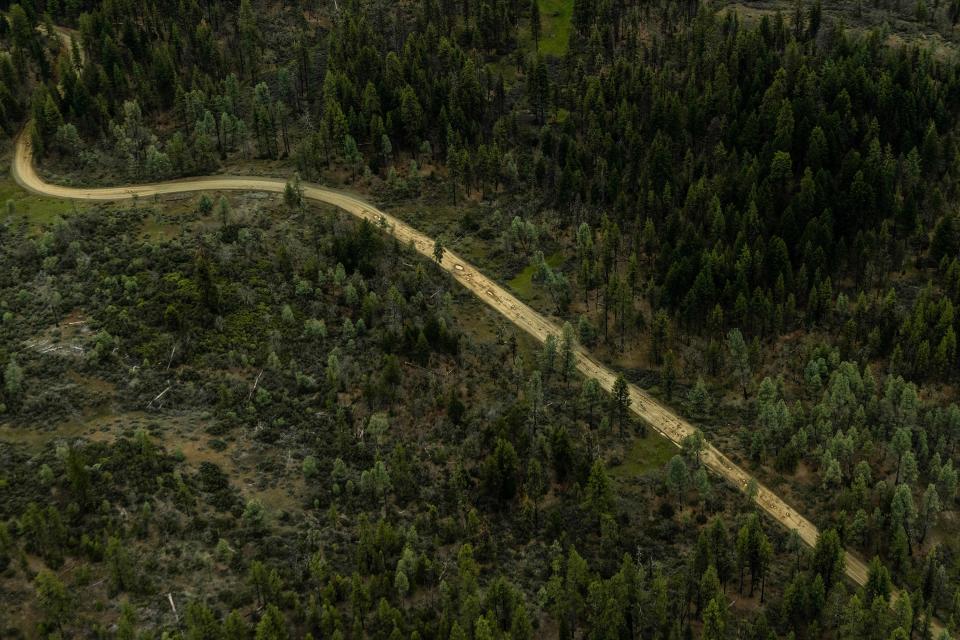
While many of the large illegal grows are run by foreign criminal syndicates, Kendall pointed to a Potter Valley native who killed and beheaded two of his farm workers in 2021 near the town of Willits, in central Mendocino County.
Investigators found the headless bodies of a 17-year-old and his father, who came from Mexico seeking work, on a second property owned by Christopher Wayne Gamble in a ditch under a pile of tires that had been set on fire. Their heads were never found.
Kendall said he's not sure if Gamble's illegal operation was connected to organized crime, but Gamble estimated he had $500,000 worth of marijuana, much larger than the typical mom-and-pop growers.
"It's my opinion they had a fallout, a dispute over wages or worker treatment," Kendall said of the suspected motive.
On May 8, a jury convicted Gamble of first-degree murder of the teen and second-degree murder of the father, according to a release by the Mendocino County District Attorney.
Trinity County is currently prosecuting its first human trafficking case after a woman told sheriff's investigators in December that Gilbert Cha sexually assaulted her and tried to block her from leaving.
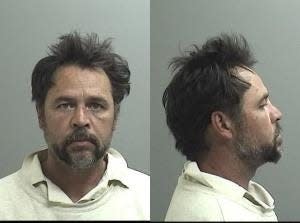
"She was held against her will at the cultivation site," said Saxon, the Trinity sheriff. " When she wanted to leave, she was assaulted, she was threatened and an attempt was made on her life. She was lucky enough that when she made her escape, it was in a populated area, and he was unable to get her back under a control."
Cha, 67, of Sacramento, maintains his innocence on charges of rape, poisoning, human trafficking, false imprisonment and illegally possessing marijuana for sale.
The District Attorney's victim advocate, who asked that her name be withheld for her protection, said she helped connect the woman to services and will coax her through the court process.
Sgt. Nate Trujillo, a detective with the Trinity County Sheriff's major crimes unit, said listening to the accuser describe her ordeal was "very eye-opening" and likely similar to cases that remain unreported.
"It was very emotional for me to hear the things the victim went through — the terror."
More: He reached 'kingpin' status by selling Mexican cartel-supplied drugs. But betrayal awaited
Mexican cartels and other criminal syndicates are advertising in publications in Europe seeking seasonal workers in and around the Emerald Triangle, said Lelehnia DuBois, former chair of the Humboldt County Human Rights Commission. She met with two female workers who described abuse they endured here.
"If they didn't take their clothes off, they were stun gunned," DuBois said. "They would have to dance and walk around naked at night after working on the farm all day. And they were made to cook dinner.
"This was organized crime, a cartel, taking advantage of the ability to grow and hide up here."
The victims, who shared only their first names with DuBois, left the area without reporting the abuse to police.
DuBois said some workers don't report abuse because they fear being blacklisted from farms when they need the income.
This scenario is far too common. Often, victims who may be intimidated by police or scared of the illegal cultivators and don't speak English refuse to cooperate with the investigation.
"We've got Mexican cartel groups coming up to grow pot, and people from Bulgaria, France and Russia," said Brady, the Trinity district attorney.
In a case of labor trafficking, three young men recently told sheriff's investigators they were held on an illegal grow site in Trinity County against their will and were told they each had to pay $3,000 for transportation out of the mountains.
After they were rescued, they fled back to Mexico without leaving contact information. No victim, no case.
"It's hard to get victims to testify," Trujillo said. "They're scared."
‘Cartels are operating with impunity there’
The Courier Journal spent about two weeks in Northern California and Southern Oregon in April and May to learn about the frequent claims of abuse of workers and animals on illegal cultivation sites. We talked with several regional sheriffs, local residents, prosecutors, cultivators, farmworkers, animal rescue workers and trafficking victim advocates.
The problems on some of those sites, including workers living without electricity or plumbing, are emblematic of a larger problem throughout the region and stretching into Southern Oregon.
Robert Hammer, special agent in charge of Homeland Security Investigations in the Pacific Northwest, said many Americans would be stunned if they realized the prevalence of modern-day slavery associated with illegal marijuana grows.

Some Mexican cartel members have moved to Southern Oregon to operate large cannabis operations, and other cartel members supervise U.S. grows from Mexico during communications with cultivators, Hammer said.
Agents have confirmed U.S. cannabis grows by both the Sinaloa Cartel, once led by notorious drug lord "El Chapo," and the lesser-known powerhouse Cártel Jalisco Nueva Generción, known as CJNG or the Jalisco Cartel. The U.S. Drug Enforcement Administration blames these top two cartels for the bulk of illegal drugs in the U.S., including deadly fentanyl, according to an unclassified 2020 DEA intelligence report.
While Mexican cartels seem to control the largest amount of illegal marijuana grows in the area, Hammer said agents also have verified criminal networks from China, Bulgaria and Russia.
Homeland Security Investigations agents are working with local non-profit organizations to reach out to victims of sex and labor trafficking to earn trust ― essential for catching and prosecuting the abusers. Hammer's office also has helped train narcotics investigators in two hard-hit southern Oregon counties, Jackson and Josephine, which border California.
U.S. Rep. Jared Huffman, who represents California's North Coast region, said he believes human trafficking is a "localized crisis" across parts of his district, especially in towns such as Covelo in Mendocino County. In 2021, The Courier Journal spent a week in that area, learning about Mexican cartel encroachment in Covelo, a small town in a valley in a northern part of the county that includes the Round Valley Indian Reservation.
"Cartels are operating with impunity there," the Democratic congressman said, citing limited sheriff's department resources to police an expansive area.
Huffman said he's exploring options, including possibly cross-deputizing members of local tribes to increase police manpower.
Criminal organizations are drawn to the Emerald Triangle because of its remoteness, which includes extensive mountains and lush forests that offer camouflage for illegal grows.
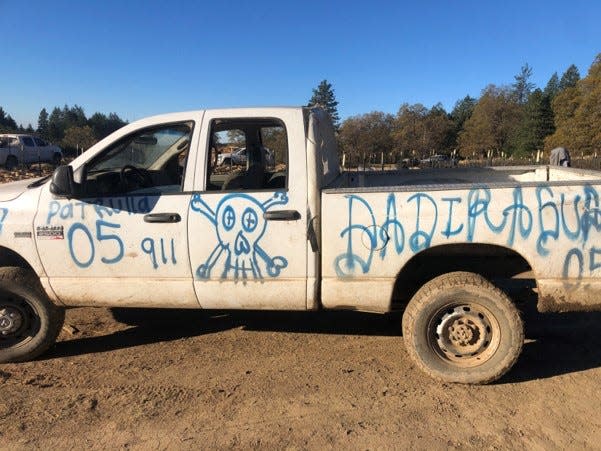
Even when police or code enforcers get a bird's eye view from helicopters, illegal grows look the same as legal ones, so more legwork must be done to match the coordinates with existing permits. There are about 380 permits approved or pending to legally grow cannabis in Trinity County, Brady said.
And illegal growers, estimated to total in the thousands, know they far outnumber law officers here. In Trinity County, it takes four hours to drive from the southern part of the county to its northern border, yet there are only 22 deputies when the department is at full staff. There are no city police officers.
Backup for deputies can take an hour.
Often there are only two deputies on a shift patrolling the county's sprawling 3,200 square miles, nearly twice the land mass of Rhode Island. And many of its rugged dirt roads snake up into the mountains, so growers, positioned up high, can hear police caravans and see dust clouds in time to run into the woods to avoid arrest.
Trujillo, in charge of illegal marijuana investigations, said he has seen signs of the Sinaloa Cartel, including a white truck spray-painted with "CDS Patrulla," Spanish for the Cártel de Sinaloa patrol. Cartels often mark trucks and SUVs with graffiti in Mexico as a show of force to intimidate others.
Black market grows are a top concern in Shasta County, east of Trinity, which formed its own MET or Marijuana Eradication Team, last year.
"What we're dealing with are DTOs ― drug trafficking organizations ― and the Mexican cartels are a big player," said Lt. Chris Edwards, with the Shasta County Sheriff's Office.
"Think of (Interstate) 5 as a big vein. It goes all the way from the Mexican border into Canada, and it's a drug route" to cart illegal marijuana and other drugs in and out of the county.
"There are areas I won't go fish and hunt and hike in," he said, after finding guns and ammunition on illegal grow sites. "It's a major problem, and we're doing our best to combat it."
‘Many of these folks are victims’
It's hard to quantify the extent of the abuse workers suffer on illegal marijuana grows, but law enforcement officials believe it's common.
"We're opening our eyes," said Saxon, the Trinity sheriff. "We're having a paradigm shift.
"As law enforcement, for years and years we treated everyone as suspects" at non-permitted grow sites. "Now, we're realizing that many of these folks are victims."
Saxon and the other two sheriffs in the Emerald Triangle teamed with Butte and Lake counties last year to form an anti-human trafficking coalition. Their deputies are learning how to spot signs of sex and labor trafficking, which means victims are held against their will and might have endured everything from unsanitary living conditions and unpaid wages to sexual abuse.
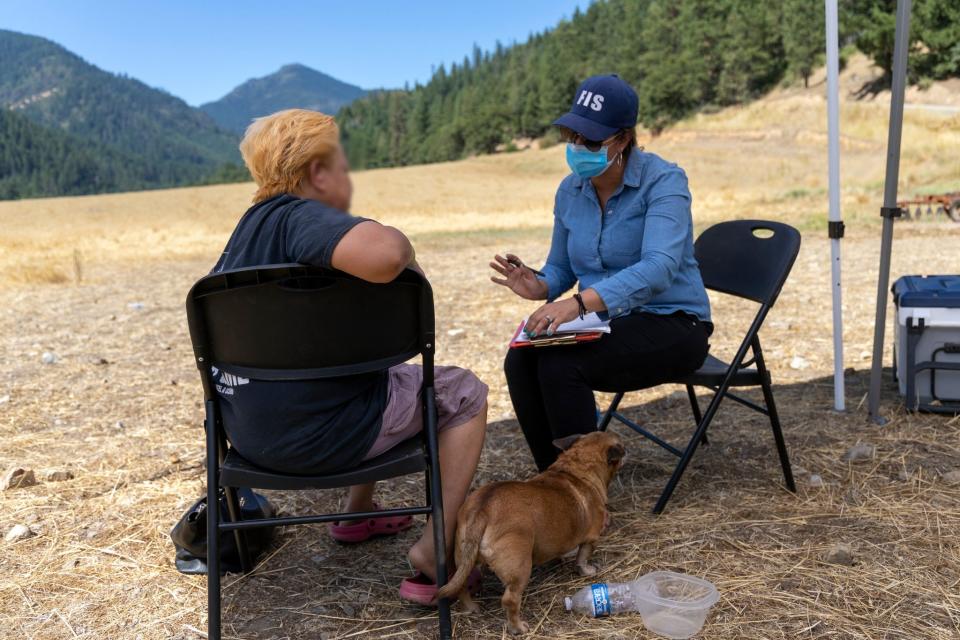
"The training is beginning to pay off," said Kendall, the Mendocino sheriff, who referred a sex trafficking case to prosecutors.
He declined to discuss details about the ongoing case, but it involves a woman brought in from Mexico.
The sheriff said his investigators also busted an illegal grow last year where workers were living in squalor and were labor trafficked, but the victims opted not to speak out against their boss.
Victims of sex or labor trafficking can find confidential help by calling the 24-hour National Human Trafficking Hotline at 888-373-7888 with services in Spanish and English. Also, local law enforcement can investigate abuse and connect victims to area services.
The Polaris Project non-profit organization offers information about labor and sex trafficking and how citizens and governments can help at www.polarisproject.org.
For more information about the rights of farmworkers in the Rogue Valley, contact UNETE Oregon at www.uneteoregon.org.
His deputies also stumbled upon a frightened 16-year-old in 2021 brought from Mexico and dropped off at an illegal marijuana grow in Covelo. She didn't speak English and had no idea where she was or how to get home. Deputies believe she was brought in as a sex slave for workers. No one was charged, but county officials eventually reunited her with relatives.
Police in the Emerald Triangle now frequently team with victim's advocates to check on workers' welfare at grow sites using a screening tool from the Northern California Coalition to Safeguard Communities.
They separate workers from the farm boss and ask several questions, including if the workers have access to their identification, if they know where they are, if they have enough food and get sufficient sleep and if they are getting paid what they were promised.
If someone says they want to leave, they are offered help.
He now considers the area ‘uninhabitable’
As April turned to May, Trujillo suited up with a protective vest and gun and headed out to serve search warrants at eight grows, suspected to be illegal, south of Weaverville in the Hayfork community.
The veteran Trinity detective knew the risks. When he and four deputies went to extract a group of workers off an illegal grow toward the county's southern edge in 2019, a gunman opened fire with a rifle.
Trujillo fired back. The workers escaped into the woods, and the gunman tried to run but was captured and prosecuted.
The incident started when landowner Lawrence Leggitt, now 70, learned someone was trespassing on his 160-acre property and growing marijuana. He was living in another city while building a house on the property.
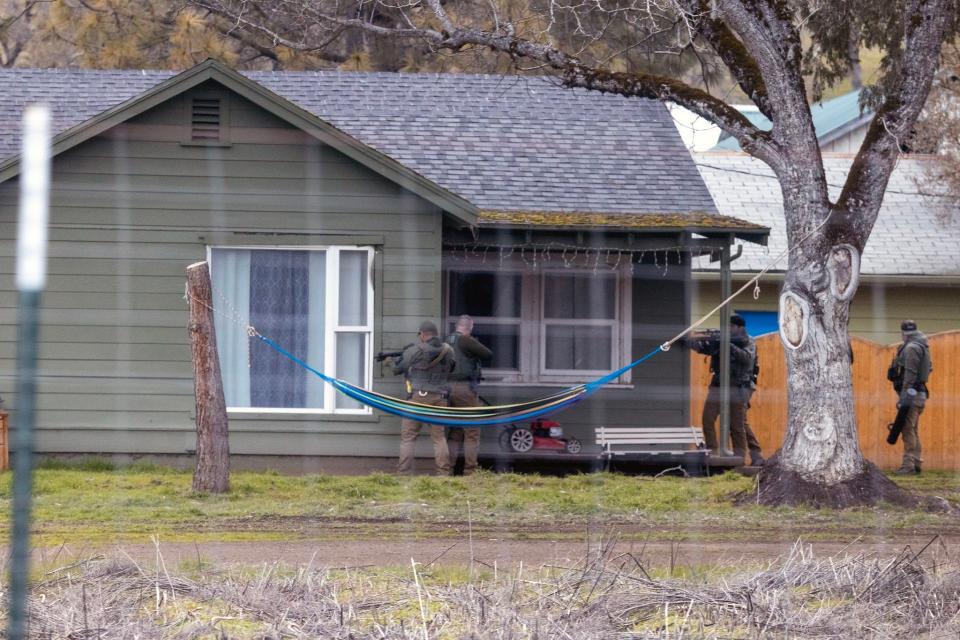
The gunman, Luis Hernan Cornego Becerra, originally from Michoacán, Mexico, had a "Sur 13" Surenos gang tattoo on his neck, according to police photos. He eventually pleaded guilty to assault with a deadly weapon and was sent to prison.
Leggitt said he stopped building the house and now considers the area, dotted with illegal hoop houses, "uninhabitable."
Trespass grows on private land are becoming more common. But some property owners lease to cultivators. And cartels and other large criminal syndicates have bought parcels.
Recently, when Trujillo headed south of Weaverville to search several suspected illegal grows in the communities of Hayfork and Trinity Pines, known to locals as "Pot Mountain," he took a lot of backup ― about a dozen armed deputies from Trinity and Siskiyou counties.
Some of the roads were cut by traffickers and are bumpy paths with large potholes, at times slowing police SUVs to 10 mph.
Illegal growers prefer the rough ride, which slows down would-be thieves, as well as police. Sometimes they also tear down street signs to make it harder to find their location.
During some of the searches, investigators found military-grade bullet-resistant vests and guns that included assault rifles with scopes and makeshift silencers.
At some of the sites, skinny guard dogs were chained to trees or in small cages. Banned pesticides also were found ― chemicals that can seep into the ground and water supply.

Small plywood structures to house workers, with no plumbing for showers or toilets, are common at grow sites. That's little protection from chilly nights that can plummet below freezing, with snow continuing through April. Some workers have died of carbon monoxide poisoning after using propane heaters without proper ventilation.
And summers without air conditioning or fans can be sweltering. Trash is often piled high.
"I've seen open sewer pits, having to go to the bathroom in buckets," Trujillo said. "Fleas and flies and dogs. Sleeping in tiny shacks. The conditions they live in are almost like a third-world country."
No charges of worker mistreatment were leveled during Trujillo's searches that day. Two of the cultivators who were searched told The Courier Journal they had state growing permits but didn’t wait for their county permit because the process was too long and confusing.
More: Tennessee prisoner charged with running drug ring behind bars linked to Mexican cartels
‘Tip of the spear’
Across state lines in southern Oregon, police have strong allies as they battle worker abuse on illegal grows.
Jackson County Sheriff Nate Sickler said his county has faced illegal grows for years, so he sought state and federal assistance.
"For Oregon, we were kind of at the apex or the forefront, the tip of the spear for illegal marijuana. In 2021, we got absolutely bombarded with thousands and thousands of illegal grows."
The sheriff's pleas for help resulted in assistance from Homeland Security Investigations.
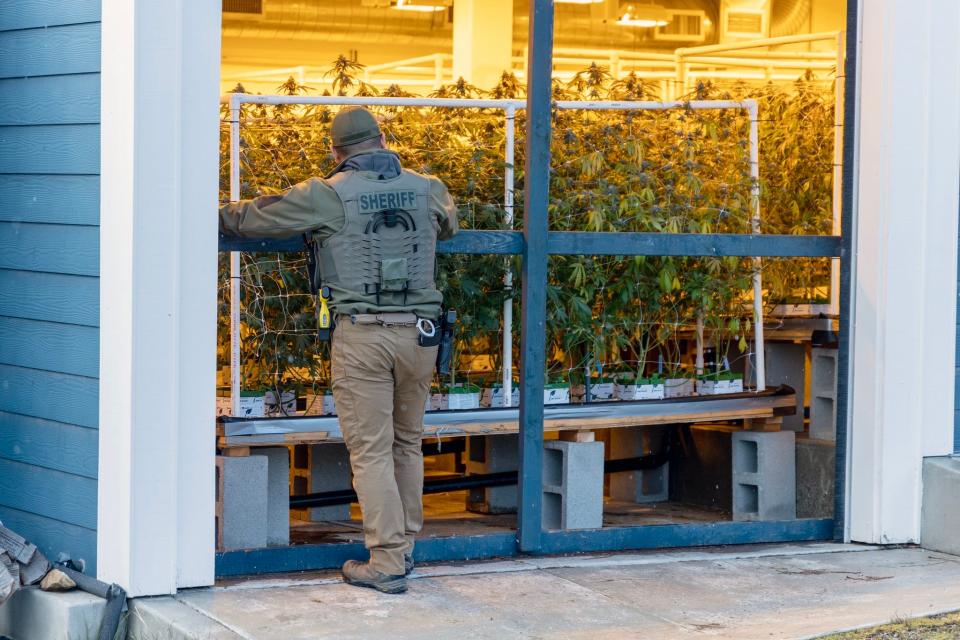
Oregon state lawmakers also helped fund services for victimized workers, who often need counseling, emergency housing and a ticket back to their hometown or country.
Like their counterparts in northern California, local authorities and advocates also battle a reluctance by victims to speak out about labor or sex trafficking.
"Victims don’t want to talk against the cartel because of the risk to them and to family members back in Mexico," Sickler said.
Homeland Security Investigations teams with local non-profits to reach exploited workers.
In Southern Oregon, they turn to UNETE Oregon, a center for farmworker advocacy. It offers services in English and Spanish and has been helping farmworkers and immigrants in the Rogue Valley area for 26 years.
"We believe there are a lot of missing people" who disappear from illegal cannabis grows, said Dagoberto Morales, UNETE's director.
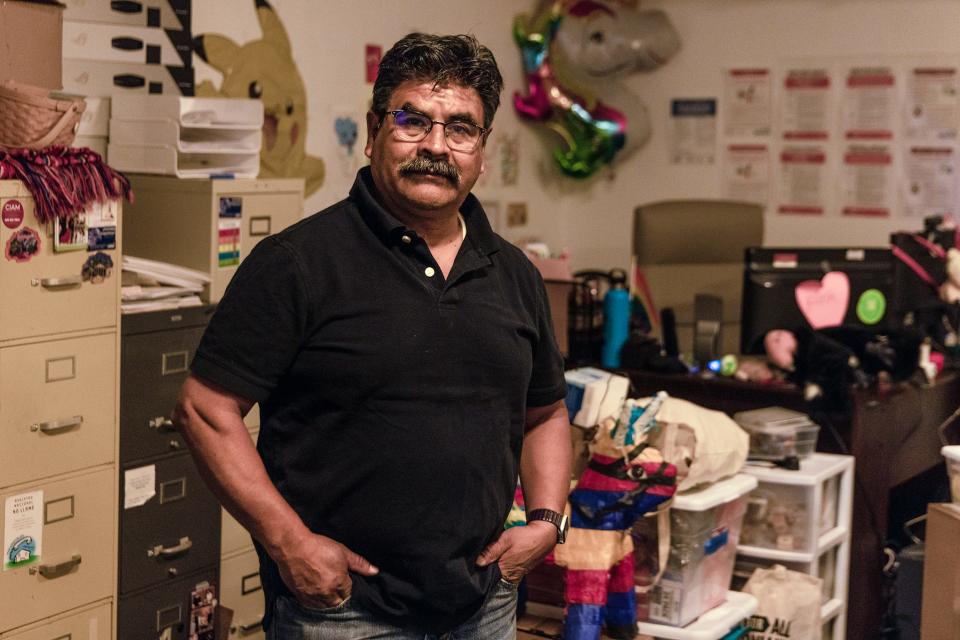
He pointed to one case where two men from Mexico were last seen in Medford, Oregon, headed to a cannabis farm in Yreka, a city in Siskiyou County, which is sandwiched between Jackson County, Oregon, to the north and Trinity County to the south.
In another case, a man from Spain said he was victimized on a grow in Josephine County, to the west of Jackson County and bordering California. The man told Morales he was promised $120,000 but was paid $300.
When the worker demanded his earnings, the growers shot at him. He ran, hopped into his car and sped off as a truck followed him. He hid out in the woods for a couple of days before escaping. Sheriff's officials called UNETE to go and pick up the victim.
Sometimes the cultivators show workers their guns or even shoot into the air, serving as a warning to follow orders, Morales said.
He said other workers are made to work 16 or more hours without a break and sometimes without a meal. And women are sometimes sexually assaulted.
They come from Mexico, Argentina, Chile, Spain, Honduras, El Salvador, Venezuela and Colombia and have often spent all of their money to get to the cannabis farms, Morales said.
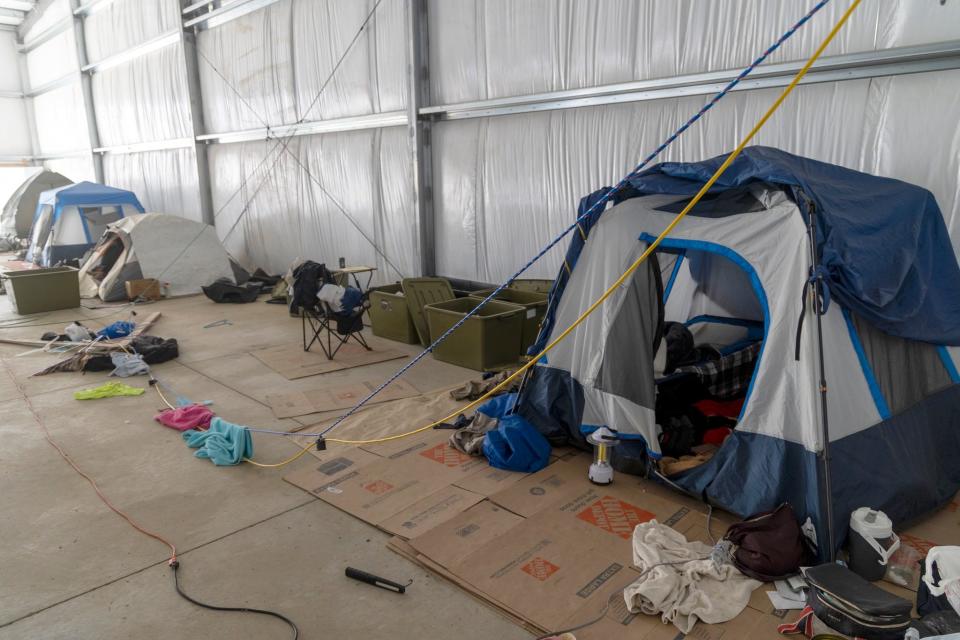
"It's a nightmare," he said. "And it's hard for them to get out. Some people feel trapped."
Saxon, the Trinity County sheriff, said: "I think we're just now cracking the surface of what is going and how long it's been going on.
"For those individuals who think: 'I can go to this grow site and trim for three months and make a whole boatload of money,' hopefully, they will open their eyes and realize that maybe it's not such a good idea."
Staff writer Connor Giffin contributed to this report. Reach reporter Beth Warren at bwarren@courier-journal.com, 502-582-7164 and on Twitter @BethWarrenCJ.
This article originally appeared on Louisville Courier Journal: Cartel-backed pot grows linked to California, Oregon human trafficking

 Yahoo Autos
Yahoo Autos 